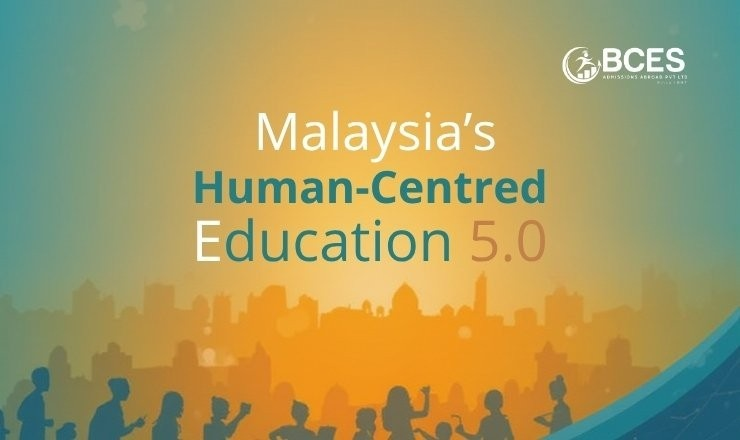Malaysia's Human-Centred Education 5.0: A Transformative Experience for Indian Citizens in 2026

19 November 2025
Malaysia’s human-centred Education 5.0 model presents a platform with limitless possibilities for students pursuing an international learning experience that provides them with future-proof skills. It combines advanced digital technology with creativity, emotional intelligence, and an authentic learning experience- an authentic learning ecosystem that is meaningful, nurturing, and globally connected. Malaysian education’s latest transformation offers an opportunity that is both modern and full of meaning for students from India seeking higher education abroad.
This article has been developed for BCES Admissions Abroad to help Indian students understand how Malaysia’s Education 5.0 vision can shape their academic and professional future. Unique in this system is the preparation of students not only for jobs but also for the challenges and opportunities of a rapidly changing world. Instead of restricting learning to theories, innovation, collaboration, digital confidence, and strong communication skills are what Malaysian universities now emphasize.
Malaysian universities have already incorporated AI-based platforms, virtual labs, simulation tools, and interactive learning dashboards into their teaching methodology, with flexible classroom environments. The country is in the process of creating a future-ready education ecosystem supportive of the needs of diverse learners. This means Indian students can pursue their studies in an environment where technology supports learning without adding any complications or stress.
Personalized learning remains as arguably the most attractive feature of Education 5.0. Students are prompted to think creatively, engage and work with ideas both across disciplines and in industry-led projects that commit to obtaining practical experience. This ensures that students will learn to develop the confidence, adaptability, and global outlook that is expected by all industries, including business, engineering, IT, design, hospitality, and the creative industry.
Moreover, Indian students will also experience the multicultural context of Malaysia, where diversity is part of everyday living. Academic English is spoken daily, so students can engage in discussions, presentations, internships, and group projects with ease. It is noted, the friendly environment enables students to quickly acclimate, enhancing their transition, settlement, and overall enjoyment.
The Sustainability and Social Responsibility aspect of the Education 5.0 model is an additional strength. It provides students with the understanding of how innovation can contribute to communities, support the environment, and ultimately contribute to sustained global development. These aspects are increasingly valuable to employers who want students to have the technical skills and desire to have an ethical understanding.
The introduction of smart learning tools has also changed how students interact with their coursework. Features such as virtual experimentation, AI-supported feedback, cloud-based collaboration, and digital resource hubs create learning opportunities for students at their own pace while staying connected to real industry trends. These tools give learners the flexibility to progress confidently and stay future-ready.
The continuous focus of Malaysia on global partnerships is another advantage for Indian students. Renewed partnerships with universities and industries located in Europe, Asia, and the Middle East will provide another opportunity to engage in global projects, share experiences, research across borders, and facilitate global connections. This experience will enhance students’ understanding of how businesses and industries operate in different parts of the world, positioning them well in a competitive marketplace.
Studying under the banner of Malaysia’s Education 5.0 vision would involve more than just receiving a qualification. It would also involve transformation into a self-reliant, confident, and resilient thinker that will thrive in future environments. This academic journey Indian students will experience in Malaysia will be holistic and will enrich academic knowledge, digital competencies, interpersonal skill development, and enhance students’ cultural literacy.
Students can also contact BCES Admissions Abroad for expert guidance on choosing the right university and program, aligned with the new Education 5.0 direction in Malaysia, together with counselling and full admission support.
Frequently Asked Questions (FAQs)
This is a human-centered education model consisting of technology, creativity, communication, and real-world learning to enhance students’ exposure and engagement as they prepare for the global workplace.
This is an experiential learning model that focuses on how individuals can benefit from multiculturalism, use of digital toolkit, contemporary pedagogies, and stronger industrial links/engagement to become better prepared and engaged in the world of work.
Yes, all universities in Malaysia use English for classes, written assessments due dates, and academic communication for all universities; therefore Indian students should feel more at home in their learning and demand for English language engagement.
Business, engineering, IT, hospitality, design, and creative industries programs are the current beneficiaries of Malaysia’s increased immunity to local learning systems.
Yes, the model addresses inquiry and critical thinking, innovation and creativity, digital literacies and cultural dispositions and understanding of the required skills needed for the global world of work.